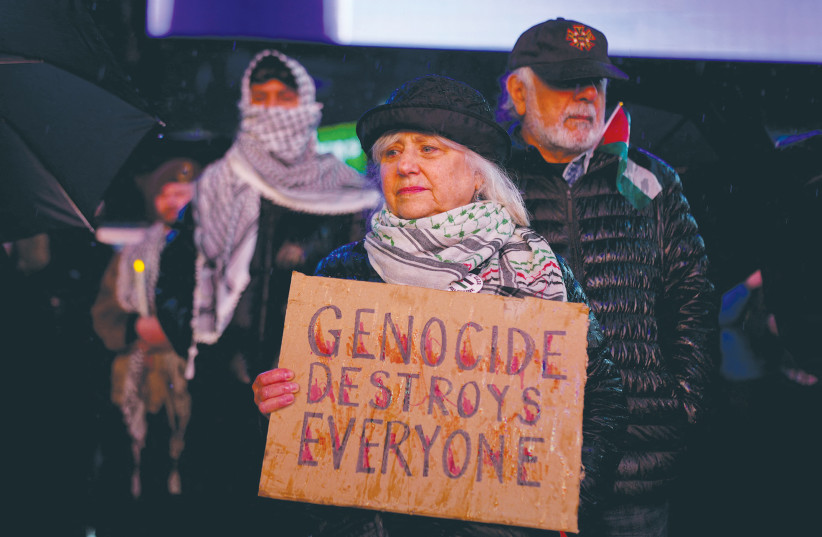In recent years, we often encounter various attempts by people adversely affected by historical tragedies, or intent on campaigning for ostensibly “humanitarian” causes, to claim that their issue is equivalent to the Holocaust, or is in fact a case of genocide.
Whether it is those like PETA, who are campaigning for animal rights, who invoke Treblinka, one of the worst Nazi death camps, to pursue their goals, or those campaigning against abortions, who compare the plight of the aborted unborn children to that of the victims of the Shoa.
The same is true regarding the use of the term genocide, which in recent years has been applied in cases which do not fulfill the criteria of the original definition of that crime. What has happened in the past few decades, is that accusations of genocide have emerged as a political tool to be used against enemies to attain geographic and/or financial gains by claiming lost territory and/or reparations for damages incurred.
A glaring example is the upcoming United Nations General Assembly (UNGA) resolution to officially recognize the massacre of several thousand Bosniak Moslem men at Srebenica as a case of genocide. Yet anyone acquainted with that event, as well as with the original definition of “genocide,” knows very well that the crime committed by the Serbian troops does not fit the definition of genocide, for the simple reason that the women and children at Srebenica were ALL released unharmed.
In the realm of historical tragedies, the intent behind actions speaks volumes about their designation. The upcoming United Nations General Assembly (UNGA) resolution to officially recognize the Srebrenica massacre as a genocide is a well-intentioned move plagued by potential pitfalls that could exacerbate tensions rather than foster reconciliation.
The resolution, presented notably by Germany and Rwanda, two nations with their own dark historys of genocide, has stirred considerable debate. This is not merely an academic exercise in labeling but a significant political act with real-world repercussions.

Perilous ramifications of unilateral genocide labeling
Firstly, the resolution threatens to destabilize the already fragile Balkan region. The wounds of the Yugoslav Wars are far from healed, and the scars of conflict remain tender. Labeling the Srebrenica massacre as genocide without unanimous agreement risks igniting the smoldering resentments among the Serbian population in Bosnia, Serbia, and Montenegro. It's a precarious step that might unravel the delicate threads of peace and cooperation painstakingly woven over decades.
Moreover, the UNGA has historically recognized genocide only under conditions of consensus. The term ‘genocide’ carries a profound weight, demanding careful consideration and unanimous agreement. To declare Srebrenica a genocide without such consensus not only breaks from tradition but may also dilute the term's significance. The charge of genocide should not be made lightly nor without irrefutable evidence and broad agreement that reflects the gravity of such an accusation.
Complicating matters further, the unilateral submission of the resolution by the BiH Ambassador oversteps the constitutional boundaries of Bosnia and Herzegovina’s foreign policy formulation, governed by its Presidency. Endorsing this resolution under such circumstances might inadvertently support a breach of national and international legal norms, setting a precarious precedent.
Lastly, the implications for Israel are particularly concerning. The rationale used in this resolution could very easily be misapplied to other conflicts, including Israel's actions in Gaza. Such a precedent risks the political weaponization of the term 'genocide,' potentially leading to its misuse in international arenas against Israel and others. The term must remain strictly defined and used with the utmost caution, reserved for clear, unequivocal instances as defined by international law.
It is imperative that we scrutinize the motives and potential outcomes of this resolution. We must question whether its adoption will truly serve the victims of Srebrenica or merely reopen old wounds and sow new discord. Can international law be wielded as a tool for historical justice, or will it be misused as a weapon in political skirmishes? As someone who has dedicated his life to hunting Nazis and seeking justice for the victims of the Holocaust, I understand the deep desire for recognition and reconciliation.
However, true reconciliation comes from a careful, considered approach that respects the complexities of historical context and the sensitivities of all involved parties. Thus, I urge the members of the UNGA to reconsider the path they are about to take. It is a path fraught with risks and unintended consequences. Let us seek a route that leads to genuine healing and reconciliation, not one that divides us further.
